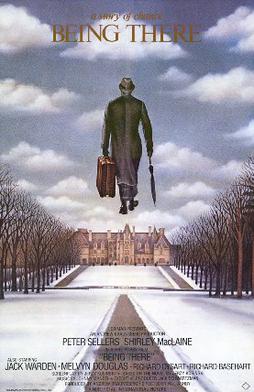The Hundredth Chance may refer to:
- The Hundredth Chance (novel), a 1917 novel by Ethel M. Dell
- The Hundredth Chance (film), a 1920 British silent film based on the novel
The Hundredth Chance may refer to:
Chance may refer to:

Being There is a 1979 American satirical comedy-drama film starring Peter Sellers, Shirley MacLaine, and Melvyn Douglas. Directed by Hal Ashby, it is based on the 1970 novel of the same name by Jerzy Kosiński, and adapted for the screen by Kosiński and the uncredited Robert C. Jones. Jack Warden, Richard Dysart, and Richard Basehart are featured in support.
Lost or LOST may refer to getting lost, or to:
Rare may refer to:
Truth be told is a figure of speech, a scheme that is a shortened version of the phrase, "If the truth be told". It is a prepositional phrase meaning "to be honest" or "in all honesty" — that what follows is the truth. It may also refer to:
Second Chances may refer to:
Eye of the Storm may refer to:
Chinaman is an archaic term for a Chinese person.
Chance of a Lifetime or The Chance of a Lifetime may refer to:
Maurice Elvey was one of the most prolific film directors in British history. He directed nearly 200 films between 1913 and 1957. During the silent film era he directed as many as twenty films per year. He also produced more than fifty films – his own as well as films directed by others.
Asphalt most often refers to:
A composite film is a feature film whose screenplay is composed of two or more distinct stories. More generally, composite structure refers to an aesthetic principle in which the narrative structure relies on contiguity and linking rather than linearity. In a composite text or film, individual pieces are complete within themselves, yet they form a whole work that is greater than the sum of its individual parts.
Fat Chance may refer to:
Chances may refer to:

"At the Hundredth Meridian" is a song by Canadian rock band The Tragically Hip. It was released in April 1993 as the fourth single from the band's 1992 album, Fully Completely. The song peaked at No. 18 on the Canadian RPM Singles chart. The song was also featured in the Due South episode "Heaven and Earth" in 1995.
The Hundredth Chance is a 1920 British silent romantic drama film directed by Maurice Elvey and starring Dennis Neilson-Terry, Mary Glynne, and Eille Norwood. It was based on the 1917 novel The Hundredth Chance by Ethel M. Dell. It is not known whether the film currently survives, which suggests that it is a lost film.
Second Chance, A Second Chance, The Second Chance, or 2nd Chance may refer to:
Life After Life may refer to:
Someone may refer to:

The Hundredth Chance is a 1917 novel by the British writer Ethel M. Dell. It was one of four of Dell's novels to make the Publishers Weekly list of top ten bestselling books during the 1910s in America. In 1927 Dell adapted the novel as a play.